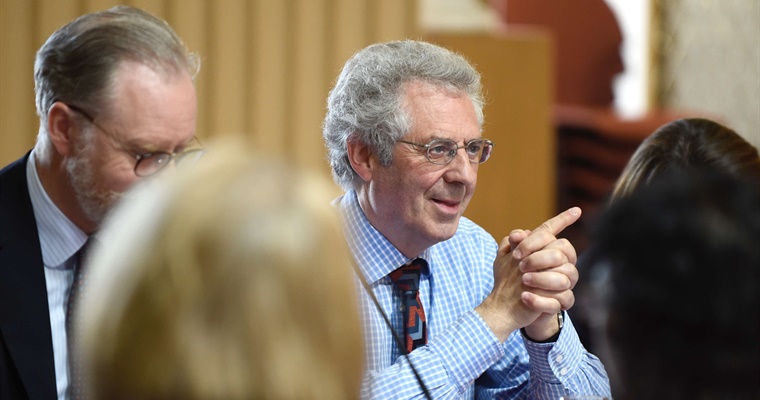Bill Moyes' post-March Council blog

Being financially prudent is an important part of being a high performing organisation. And fundamental to financial prudence is a robust and transparent approach to managing reserves. This was one of the most important items that the Council discussed at our meeting last week. We approved a change to the GDC's reserves policy, which is the policy we use to manage the level of our General Reserves. This change was made after a review found that we could make our approach more transparent and bring it in line with what the majority of other health professional regulators do.
Our previous reserves policy managed the level of our General Reserves with no regard to whether some of that resource was already committed. In practice, this means that reserves that had been allocated to depreciation of fixed assets, such as IT equipment, were being included in our calculations of available reserves.
This is misleading, however, because these resources are of course not available to be used to help manage unexpected circumstances. The Council took the view that this is not a transparent approach to reporting on or managing our level of reserves.
The review also found that the majority of other health professional regulators use what is called the 'free reserves' method for determining the appropriate level of reserves which they should hold. In practice, this means using the value of resources that are not allocated and therefore are available to be used as operational spend to help manage unexpected events.
Taking these reasons together – the fact that we want to be as transparent as possible and taking comfort with being in line with the practice of other health professional regulators - the Council took the decision to adopt using the 'free reserves' approach for determining the appropriate level of reserves we should hold and for reporting purposes.
This will mean a change to how our reserves are reported in our annual report and accounts. Under our previous reserves policy, we reported in our 2017 Annual Report and Accounts that we held £20.3 million of general reserves which equates to 5.8 months of operational spend.
However, of the £20.3 million total, the amount that is allocated to fixed assets was £10.3 million. This means that the GDC cannot use the £10.3 million for reserves purposes because it is allocated to managing depreciation of previous purchases of fixed assets, so reporting the higher figure could be unintentionally misleading. Therefore, the amount that is actually available to the GDC to use for the purposes the reserves are intended for – managing unexpected events – is in fact £10 million. This equates to 2.8 months of operational spend for the GDC.
This will mean that in our 2018 Annual Report and Accounts, which will be published in July, our reserves will seem much reduced compared to the level reported in the 2017 accounts. However, it is in fact, the true amount of resources that is available to the GDC to use for reserves purposes.
Our policy has been updated to say we will hold a level of free reserves that is a minimum of three months, with a target of between four and six months of operating spend.
The Council also received an update on the work of two groups that seek to quality assure the GDC's fitness to practise work: the Quality Assurance Group (QAG) and the Decision Scrutiny Group (DSG). The DAQ looks at issues that have been referred for discussion to extract learning. The DSG has an external chair and examines decisions at random to assess their quality. In 2018, the QAG found 16 of a total 136 decisions to be outside the reasonable range for the case and the DSG found 8 of a total 382 with fundamental issues that almost certainly have affected the final decision. A range of actions can be taken in these situations, including referral back to Initial Assessment, 'rule 9' referrals – which means an appeal on the decision after the hearing - and raising issues with the Professional Standards Authority, who oversees all of the health professional regulators. The Council were reassured of the additional levels of scrutiny and quality assurance that the QAG and DSG bring to the Fitness to Practise process.
The Council also sought to ensure that the GDC is as prepared as we can be for the UK's likely exit from the European Union.
This involves amending the GDC's statutory framework to ensure that dental professionals from the EU have a route to join the register in the future. (Changes will not impact EU dental professionals who are already on the register).
Dental professionals from the EU currently rely on rights established by the EU Directive on the Mutual Recognition of Professional Quantifications, which will cease to apply once the UK leaves the EU, if there is no deal in place.
We approved technical changes to our legislation at our meeting, which are on our website and will take affect the date that the UK leaves the EU.
Looking ahead, the GDC will be launching a consultation in May on our corporate strategy for 2020-22. There are some things we are required to do by law, there are other things we choose to do that helps us achieve our purpose of public protection and maintaining public confidence in dental services. This will be your opportunity to input into how the GDC allocates resources to achieve this. I look forward to hearing your views. The consultation will be live by the time the Council meets again in May, which will be in Cardiff. This will be the first time that the Council as a whole is visiting Wales under my chairmanship. I and the Council are looking forward to meeting with local members of the public, registrants, students and stakeholders.
 eGDC
eGDC









